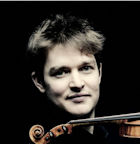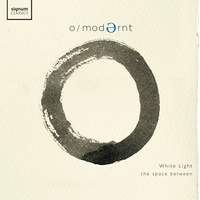Interview,
Hugo Ticciati on White Light
 ‘Mindfulness’ has become something of a buzzword over the past few years, but for the violinist Hugo Ticciati and his chamber ensemble O/Modernt it’s absolutely central to their approach to music-making: meditation and improvisation play a vital role in their rehearsals and performances, and their eclectic programming invites audiences to share in the state of heightened awareness which this generates.
‘Mindfulness’ has become something of a buzzword over the past few years, but for the violinist Hugo Ticciati and his chamber ensemble O/Modernt it’s absolutely central to their approach to music-making: meditation and improvisation play a vital role in their rehearsals and performances, and their eclectic programming invites audiences to share in the state of heightened awareness which this generates.
I spoke to Hugo shortly after his recent concert (entitled Time Unwrapped) with O/Modernt at Kings Place to discuss his long-term fascination with Indian culture and spirituality, and the philosophy behind the ensemble itself and their debut recording, which weaves together music by The Beatles, Arvo Pärt, John Tavener and Pēteris Vasks with group improvisations on melodies and rhythms drawn from Indian music.
Tell me a little about how O/Modernt came into being, and the significance of the name...
In 2001 I was asked to start a festival in Stockholm, at the Confidencen [Ulriksdal Palace Theatre]: I already knew the theatre very well, and it has an absolutely beautiful rococo interior. I have a great passion for contemporary music, improvisation, jazz and rap, so I saw it as a fantastic opportunity to connect the old and the new, and that’s how the name was born: it translates as ‘Un-Modern’. From the very beginning the mission was to connect very different musical genres, styles, traditions and epochs, and to take risks celebrating those connections; O/Modernt started as a festival and grew very quickly into an orchestra as well as a programming concept. I was soon asked by Wigmore Hall and Kings Place to do an O/Modernt programme: the idea was to challenge the audience to listen in a new way, perhaps by presenting them with music which they might know very well, but surrounded by things that would be totally new to their ears. So it’s all about the connection of the past with tradition, but at the same time the continual reinvention of that tradition within contemporary society.
How did you come up with the programme for this recording?
It begins with Arvo Pärt’s My soul yearns after the Lord, then there’s an improvisation followed by Peteris Vasks’s violin concerto Distant Light and another improvisation, then John Tavener’s Mother of God, but with Soumik Datta improvising on top with the sarod. The second CD begins with the original Mother of God, then there’s Pärt's Cantus in memoriam Benjamin Britten, and The Beatles’ Within You Without You (again all interspersed with improvisations in between), followed by a newly-composed Indian work called Raag Bhairavi which is a twenty-minute ‘grand improvisation’ around Indian melodies. So the idea to bring the contemplative Western tradition together with its classical Indian counterpart, just to play them off each other and see how they’re related: improvising takes on different motives from both of these traditions and interleaves them together.
Your website mentions your interest in mindfulness, a concept that's very popular at the moment: how much does its practice feed into your music-making and indeed into the recording itself?
For me mindfulness is part of music, part of life, part of everything, and it's something I try and work with on a daily basis: I do a lot of meditation, and as an orchestra we meditate together. With O/Modernt I try to gather musicians who have a similar (but hopefully sufficiently different to myself) approach to life and to love and to music, and draw the audience into that spirit. It’s obviously much more difficult on a CD, but there are lots of things that I do in concerts to enable the audience to become aware of themselves in the act of listening: a lot of listening is based on habit, on the idea of listening as a passive process. Improvisation is where one’s most vulnerable as a musician, playing without anything planned, and hopefully on the CD that will draw the listener into seeing our weaknesses and vulnerabilities as performers and see that being reflected in themselves. That, I think, is in itself a process of self-discovery, and for me O/Modernt is intimately related to that quest and that journey.
In the booklet-note notes I talk about the philosopher Henri Bergsen and his concept of duration: he’s always comparing the act of living to a flowing melody, where all the notes are intimately related to the past and the future but they are also the sounding presence. I think ultimately what we’re all drawn to is to be fully present and to live in the moment, and I think music is such an incredible way of experiencing that - whether one’s practising alone, practising with a group, or performing a concert. Music is a journey 'within and without', as The Beatles put it: it draws you to a silent discovery of what’s within at the same time as generating this beautiful and exuberant energy which radiates outwards and connects people.
We tend to think of improvisation (certainly within the classical tradition) as being the province of solo performers rather than large ensembles - on a purely practical level, how does orchestral improvisation work?
I think there’s something very special about the process of improvising in a group, because one is really immersing oneself in one’s own sound at the same time as having to be totally aware of everything that’s going on around you. It’s something that’s very difficult to achieve, and again it’s about mindfulness: one has to truly be one’s self in order to be able to improvise. Most of my players are free spirits and we just started with no plan other than ‘Just play and listen’! It’s all about listening, and it’s about silence: you really need to sense and tap into the energy in the process of growing from that silence, and then one can really start working and structuring. But what we’ve found helpful so far is to start with very simple exercises just to free the mind: if we free the body just to play, one’s still very much aware that one’s playing.
The front-cover image on the CD is an ensō, drawn by Antony Gormley: it’s a Japanese circle that’s an expression of the inner self that’s drawn every day, and for me it sums up the philosophy of O/Modernt and this CD, that each moment in music is a unique expression of the self.
When and how did your interest and immersion in non-Western music start?
I just love the sound-world itself: I love the sonorities of the tabla, the sarod, the sitar. But I think it really began with my interest in an Indian way of living and philosophy, which grew through yoga and meditation and through my absolute adoration of people like Gandhi, and that drew me into the Indian spirit and this incredible culture and history. Their music is so intimately connected to the way they live and have lived. I often find that in Western culture music is set apart from our living (you see a concert, then you go home and have dinner): there’s not the same sort of integral relationship between music and society. I’m completely in awe of these musicians who have a very different conceptual basis from Western performers, and who cultivate what I can only describe as a highly trained total freedom. They spent years perfecting details, nuances and rhythms so that then they can let rip and be totally free in a concert; in Western classical music we’re often wedded to the idea of having a definitive score, so one’s working to achieve something very finite. That score can of course be a window into something far greater, but I think the danger of having this printed artefact can limit the Western mind, and for me bringing that slight Indian philosophy to the way we make music in the West is very enriching.
White Light was released on Signum of 6th April and includes music by Arvo Pärt, John Tavener, Peteris Vasks and The Beatles as well as extensive improvisations connecting the works.
Available Formats: 2 CDs, MP3, FLAC, Hi-Res FLAC



